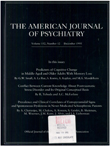Pharmacotherapy of bulimia nervosa with fluoxetine: assessment of clinically significant attitudinal change
Abstract
OBJECTIVE: The authors used an individual change model to examine the clinically significant effect of pharmacotherapy with fluoxetine on the attitudes and beliefs characteristic of bulimia nervosa. METHOD: Three hundred eighty-two women meeting DSM-III-R criteria for bulimia nervosa participated in a multicenter, double-blind, randomized clinical trial of placebo, 20 mg of fluoxetine, and 60 mg of fluoxetine for 8 weeks. Behavioral change was assessed with self-monitored measures of binge eating and purging, and psychological change was measured with the self- rating Eating Disorder Inventory and the Hamilton Rating Scale for Depression. A specific statistical method was used to determine clinically significant change in psychological measures. RESULTS: On the majority of psychological measures, more of the subjects receiving active drug than those receiving placebo showed clinically significant change. Behavioral improvement was significantly associated with the likelihood of demonstrating clinically significant psychological change. The observed effect of pharmacotherapy on attitudinal change was not related to the presence of depression at baseline. These results compare favorably with other interventions for bulimia nervosa. CONCLUSIONS: Measures of change in treatment studies should reflect clinical as well as statistical significance. In the short-term, treatment of bulimia nervosa with fluoxetine appears to produce clinically significant attitudinal and behavioral changes.
Access content
To read the fulltext, please use one of the options below to sign in or purchase access.- Personal login
- Institutional Login
- Sign in via OpenAthens
- Register for access
-
Please login/register if you wish to pair your device and check access availability.
Not a subscriber?
PsychiatryOnline subscription options offer access to the DSM-5 library, books, journals, CME, and patient resources. This all-in-one virtual library provides psychiatrists and mental health professionals with key resources for diagnosis, treatment, research, and professional development.
Need more help? PsychiatryOnline Customer Service may be reached by emailing [email protected] or by calling 800-368-5777 (in the U.S.) or 703-907-7322 (outside the U.S.).



